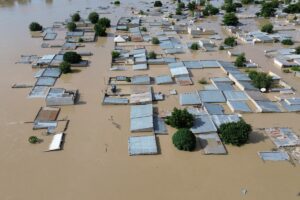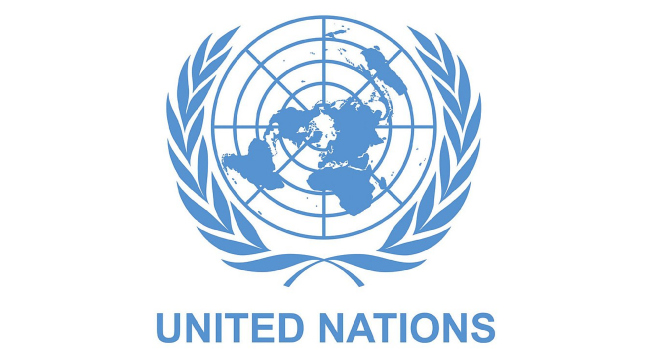The United Nations has raised serious concerns about a potential cholera outbreak in emergency Internally Displaced Person (IDP) camps in Maiduguri, Borno State, following the recent flooding that has inundated several parts of the region. These warnings come as part of a broader report issued by the UN’s Office for the Coordination of Humanitarian Affairs (OCHA), highlighting the immediate needs of those affected by the floods. The report draws attention to the precarious living conditions within the IDP camps and warns that contaminated water sources could lead to devastating outbreaks of waterborne diseases such as cholera.
According to the OCHA report, the immediate needs in the flood-affected areas include access to food, shelter, and clean water. Protection for vulnerable groups, such as unaccompanied children, the elderly, and individuals living with disabilities, remains a critical priority. The report stresses that several water sources within the camps have already been compromised by flooding, significantly increasing the risk of a public health crisis. “Intermediate needs include non-food items and interventions to prevent the outbreak of diseases such as cholera in congested sites,” the report emphasized, underscoring the urgency of implementing preventive measures.
 The flooding has also severely affected nutrition stabilization centers in Maiduguri Metropolitan Council (MMC) and Jere Local Government Areas (LGA), which are tasked with treating severely malnourished children. As a result, children already suffering from malnutrition face heightened risks of infection due to the unsanitary conditions in the camps. Beyond MMC and Jere, other areas in Borno State, including the Dalwa community in Damboa LGA and parts of Bama and Gwoza LGAs, have also been hit hard by the floods. The UN report noted that before the recent flash floods, nearly 123,000 people in Borno State had already been affected by floods and windstorms since August, leading to the destruction of critical infrastructure and increasing the likelihood of disease outbreaks, particularly in the overcrowded IDP camps.
The flooding has also severely affected nutrition stabilization centers in Maiduguri Metropolitan Council (MMC) and Jere Local Government Areas (LGA), which are tasked with treating severely malnourished children. As a result, children already suffering from malnutrition face heightened risks of infection due to the unsanitary conditions in the camps. Beyond MMC and Jere, other areas in Borno State, including the Dalwa community in Damboa LGA and parts of Bama and Gwoza LGAs, have also been hit hard by the floods. The UN report noted that before the recent flash floods, nearly 123,000 people in Borno State had already been affected by floods and windstorms since August, leading to the destruction of critical infrastructure and increasing the likelihood of disease outbreaks, particularly in the overcrowded IDP camps.
Borno is not the only state grappling with these challenges. The report highlighted the dire situation in Adamawa and Yobe states, where over 12,500 and 46,600 people, respectively, have been impacted by flooding. In Adamawa, there are growing fears that the situation could worsen due to potential flooding from the release of excess water from the Lagdo Dam in neighboring Cameroon. Early reports indicate that the dam has sustained damage due to heavy rains, though no official communication has yet been received from the Cameroonian authorities about the release of water.
Across Nigeria, the flooding crisis has reached alarming levels. According to data from the National Emergency Management Agency (NEMA), more than 800,000 people have been affected by the floods across 29 states, with over 200 lives lost. Borno State, however, remains the most severely impacted, with the highest number of displaced persons as of early September. Other states grappling with significant flooding include Bauchi, Bayelsa, Enugu, Jigawa, Kano, Niger, Sokoto, and Zamfara.
The consequences of the floods are not limited to immediate displacement and loss of life. The widespread destruction of farmlands, particularly just before the harvest season, threatens to exacerbate food insecurity in the country. Tens of thousands of hectares of crops have been destroyed, which could have long-term implications for food supply and inflation. With food and fuel prices already at record highs, the additional pressure of reduced crop yields could push more families into severe food insecurity. The report from the UN noted that “the damage to crops risks elevating food insecurity in the ongoing lean season and in the coming months,” which could further deteriorate the already critical situation.
As it stands, more than 32 million Nigerians are facing severe food insecurity, according to the March 2024 Cadre Harmonisé food security and nutrition assessment. The recent floods are expected to worsen this situation, particularly in the northeast, where conflict, displacement, and environmental challenges have already created a complex humanitarian crisis. The UN and its partners have been working tirelessly to address these challenges, and the report confirmed that their business continuity plans have been activated to ensure the delivery of critical services despite the flooding.
Maiduguri, the capital of Borno State, has been particularly hard hit, with multiple neighborhoods submerged by floodwaters. Areas such as Gwange, Bama Road, the Maiduguri Zoo, Post Office, Lagos Street, and Shehu’s Palace are among the most affected, with floodwaters displacing residents and damaging homes and businesses. The Maiduguri Main Market, Customs/Gamboru areas, and the Specialist Hospital are also facing significant flooding, with many residents being forced to relocate along Muna Road in search of safety.
In addition to these concerns, the UN report revealed that two of its guesthouses in Maiduguri have become inaccessible due to the flooding, further complicating relief efforts in the region. With thousands of people displaced and essential infrastructure damaged, the situation remains critical. Humanitarian organizations are continuing their efforts to provide aid, but the scale of the disaster requires more coordinated interventions.
The UN’s call for urgent action is a stark reminder of the vulnerability of communities living in flood-prone areas, particularly in states like Borno, Adamawa, and Yobe, where years of conflict and displacement have already strained local resources. The combination of environmental disasters and ongoing conflict has created a perfect storm, putting millions of lives at risk and demanding immediate and sustained interventions.
As the country moves forward, the NEMA, in collaboration with the UN and other humanitarian agencies, must prioritize the prevention of disease outbreaks and the provision of clean water and sanitation facilities in the flood-affected areas. Failure to do so could result in a public health catastrophe, with cholera and other waterborne diseases spreading rapidly through overcrowded IDP camps and vulnerable communities. The international community, as well as the Nigerian government, must remain vigilant and committed to addressing the humanitarian needs of those affected by the floods, ensuring that lifesaving assistance reaches those in need.




